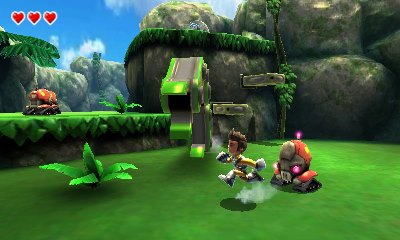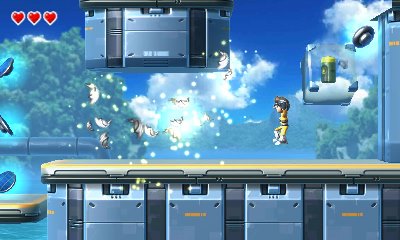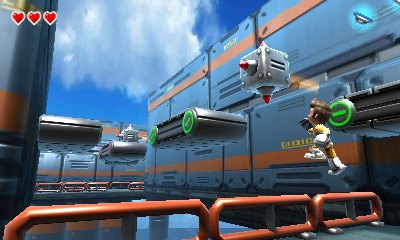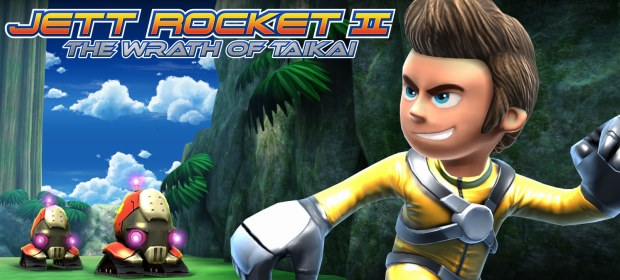This second go-around with the Jett Rocket character, first seen on WiiWare, is a thoroughly competent affair – a well-designed take on games of yesteryear, with a nice bit of modern grunt. But then, Shin’en don’t mess about. They may be an official third party developer to Nintendo, but anyone in this day and age needs some brass balls to engineer a title of this ilk on a console that is home to the pinnacle of handheld platforming. The Germans behind the superb Nano shooting games have ability in spades – they always seem to be able to squeeze brilliant performances from their hardware, delivering commendable Western takes on traditionally Japanese fare. This isn’t a title that is going to set the world on fire, but it does provide a great-looking, pleasant distraction with some decent replay value.
 Unlike its predecessor which limited Jett to a 3D plane, here the action kicks off as in 2D with gameplay reminiscent of Megaman but without the shooters. It feels resolutely old school, like you are playing a golden age SNES game, with some lovely 3D effects thrown in. Jett has a limited arsenal of moves. You can jump, wall jump, and execute a rolling spin attack to smash your enemies or break through destroyable scenery. You will obtain use of a jetpack at regular intervals –which is limited to the areas where you encounter a refuel point.
Unlike its predecessor which limited Jett to a 3D plane, here the action kicks off as in 2D with gameplay reminiscent of Megaman but without the shooters. It feels resolutely old school, like you are playing a golden age SNES game, with some lovely 3D effects thrown in. Jett has a limited arsenal of moves. You can jump, wall jump, and execute a rolling spin attack to smash your enemies or break through destroyable scenery. You will obtain use of a jetpack at regular intervals –which is limited to the areas where you encounter a refuel point.
Once you have gotten used to controlling Jett on a two dimensional stage, the game mixes things up – with some 3D levels appearing, some of which present themselves from a fixed camera angle, and others which allow you to roam freely as you could on your Wii. Sometimes the perspective will change within a level – find a portal into one of the hidden bonus stages and you may find your 2D platform hopping interrupted by a foray into three dimensions. The constant switching doesn’t always make for a fluid gaming experience. Getting used to judging distances and jumps when the viewpoint alters to 3D can be annoying, particularly when you are attempting to use the spin attack to crush an enemy and end up whizzing all over the place.
 Graphics and design are as mixed up as the perspectives on display. Steady 60fps is the order of the day, and there are some fine touches – the way dispatched enemies fly outwards in a Mode 7 style, for example, or the excellent use of lighting and textures. But then you have the generic boringness of the Jett character – even though it is essentially a throwaway platformer, there isn’t much to invest in emotionally here. There are some rather unimaginative robotic enemies, and boss encounters that feature lazy palette swapping.
Graphics and design are as mixed up as the perspectives on display. Steady 60fps is the order of the day, and there are some fine touches – the way dispatched enemies fly outwards in a Mode 7 style, for example, or the excellent use of lighting and textures. But then you have the generic boringness of the Jett character – even though it is essentially a throwaway platformer, there isn’t much to invest in emotionally here. There are some rather unimaginative robotic enemies, and boss encounters that feature lazy palette swapping.
The pace is pretty slow and deliberate, with a focus on exploring your surroundings and finding all of the Solar Panels (think: coins, rings), hidden concept art, and side-stages. It soon becomes quite compulsive, and you will find yourself replaying levels to ensure you mop up every last collectible. Solar Panels can be used to play a slot machine mini game between stages, which can earn you extra lives or vitality hearts. The bonus stages are one-shot affairs, so failure to beat them within the allotted time period means you will have to replay the main stage in order to have another crack.
 There are 15 stages across three worlds, all featuring generous checkpoints. There are boss encounters, which are varied in how you approach them tactically (even if their design is a bit lazy), and you get some diversions into other activities like jet-skiing. Beating the main game unlocks a mirrored alternative reality in which you have to find a set number of hidden Golden Solar Panels in order to progress. It gives the whole thing a nice bit of longevity.
There are 15 stages across three worlds, all featuring generous checkpoints. There are boss encounters, which are varied in how you approach them tactically (even if their design is a bit lazy), and you get some diversions into other activities like jet-skiing. Beating the main game unlocks a mirrored alternative reality in which you have to find a set number of hidden Golden Solar Panels in order to progress. It gives the whole thing a nice bit of longevity.
VERDICT: Jett Rocket II doesn’t always get it right with the way it switches things up, and some more thought could have gone into the design. Don’t expect to be utterly blown away by Shin’en’s latest – but don’t sleep on its ability to deliver a subtly compulsive experience, either. For less than a tenner you get a full thirty stages to play through, with some delightful touches that, for the most part, outweigh the flaws.

GOOD. A game that scores 7/10 is worthy of note, but unworthy of fanfare. It does many things well, but only a few of them incredibly well and, despite a handful of good qualities, fresh ideas and solid mechanics, it fails to overwhelm.
Review code provided by publisher.






